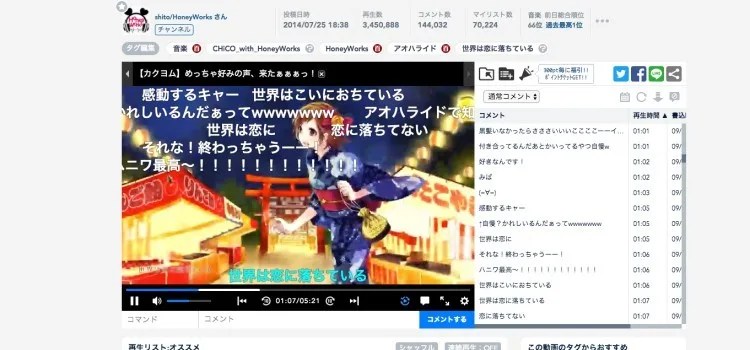Laughter is a universal element of human communication, and in the digital age, each culture has developed unique ways to express humor online. We all know the classic “kkkkkkk” from Brazil, the “rsrsrsrs,” or even the “huehuehue” that became famous around. But how do the Japanese laugh on the internet or in their media? Let’s explore some of the most common laughs used in Japan, many of them filled with cultural nuances and specific meanings.
Table of Contents
The Kanji 笑 and Online Laughter
The kanji 笑 (wara) literally means “laughter” or “to laugh” and is widely used on the internet, similar to how “lol” is used in English. It often appears in parentheses: (笑). Additionally, the Japanese also write “www” as an abbreviated form of warai or warau, and you will see this repeated in chats to indicate continuous laughter, like “wwwwwwwwww”.

The Most Used Laughs in Japan
In Japan, online laughter and in animes or mangas are often represented by onomatopoeias. They appear in various forms and can be as varied as the characters or situations that inspire them. These expressions of laughter are not restricted to the digital environment: you will see these forms of laughter being used in manga dialogues, anime scenes, and even in everyday communication.
ははははは (Ha! ha! ha!)
The most common and simple laugh, “ははははは” is similar to our “hahaha”. It is often used especially by men and expresses a direct and genuine laugh, without pretensions. It is a strong laugh typical of someone who is really having fun.
ひひひひひ (hihihihihi)
“ひひひひひ” is a sinister laugh, often used by characters who are plotting something or about to pull a prank. Imagine someone thinking of a clever plan or something darkly humorous; this laugh brings that feeling of “something is about to happen”.
ふふふふふ (fufufufufu)
“ふふふふふ” can be a scary, mysterious, or even malicious laugh. It is often a laugh of villains or characters with an enigmatic side. It is also associated with women who smile elegantly but with ulterior motives.
へへへへへ (hehehehehehe)
This is a laugh of shyness or embarrassment. “へへへへへ” is used by people who are trying to hide an embarrassment or who feel ashamed for not being able to do something. It is that typical “hehe” of someone trying to disguise discomfort.
ほほほほほ (hohohohoho)
“ほほほほほ” is a feminine laugh, usually used by high-society women, such as ladies or noble characters. It is an elegant laugh, but also a bit old-fashioned, as if a lady were laughing with her mouth open in a haughty manner.
ニコニコ (Niko Niko)
Niko-Niko / Nikkori / Niko!: As mentioned earlier in an article on the site, “Niko-niko” represents a cheerful and silent smile, like someone who is visibly happy without making a sound.

Vowels and Variations of Laughter
You can also find variations where vowels are used to modify the sound of laughter, making it more expressive or casual. For example:
- あはははは – Ahahahaha: An open and contagious laugh, similar to our “hahahaha”.
- いひひひひ – Ihihihihi: A mischievous laugh, used by someone who made a joke.
- うふふふふ – Ufufufufu: A feminine, graceful, and mysterious laugh.
- えへへへへ – Ehehehehe: An embarrassed or shy laugh.
- おほほほほ – Ohohohoho: A sophisticated and pompous laugh, used by ladies.
Other Popular Laughs and Their Nuances
In addition to the five main ones, there are a number of specific laughs that convey different emotions:
Kya! ha! ha! / Wa! ha! ha! / Gwa! ha! ha!
- Kya! ha! ha!: A childish laugh, used by children or characters with a youthful nature.
- Wa! ha! ha! and Gwa! ha! ha!: Loud and mischievous guffaws, typical of villains in animes, trying to sound more threatening.
Kara-kara / Gera-gera / Geta-geta
- Kara-kara: A dry laugh, sounding like “kara-kara”. Imagine someone laughing without enthusiasm or at something not very funny.
- Gera-gera: An unmodest laugh, which can be disdainful. People who laugh “gera-gera” often do so without worrying about being polite.
- Geta-geta: A loud, boisterous, and brazen laugh, usually associated with a lack of modesty.
Ku-ku-ku / Kutsu-kutsu
- Ku-ku-ku: A muffled laugh, like someone holding back laughter or laughing discreetly while reading something funny.
- Kutsu-kutsu: A silent laugh, ideal for when a person laughs alone while remembering something funny.
I! hi hi hi! / Kya! Kya!
- I! hi hi hi!: A vulgar or provocative laugh, like someone making a double entendre joke.
- Kya! Kya!: A childish laugh, used by babies or small children.
Keta-keta / Koro-koro / Ke! ke! ke!
- Keta-keta: An indecent laugh, indicating that someone is not taking the situation seriously.
- Koro-koro: A pleasant and feminine laugh, like a rolling ball, suggesting that only women would laugh this way.
- Ke! ke! ke!: A scornful laugh, common among villains in mangas.


Leave a Reply